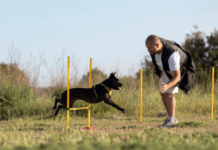Last Updated on October 18, 2024 by Dogs Vets
The Ultimate Dog Training Blueprint!

The Hidden Dangers of Untrained Dogs
Imagine the unthinkable: your beloved dog, once a gentle companion, now poses a risk to themselves and others due to lack of training. The consequences can be devastating.
- Statistic: Untrained dogs are 3 times more likely to be involved in biting incidents. (Source: American Veterinary Medical Association (AVMA))
- Emotional Appeal: Ensure your furry friend remains a cherished member of your family, not a liability. It’s time to unlock the secret to effective dog training.
Deciphering Canine Language: A Dog Training Primer
Understanding Body Language:
- Tail Wagging: Not always a sign of happiness; can indicate anxiety.
- Direct Eye Contact: A challenge or sign of aggression.
- Ears Back: Fear or submission.
Key Training Techniques:
- Positive Reinforcement: Reward desired behaviors.
- Consistency: Establish a routine for clear communication.
- Socialization: Expose your dog to various environments and people.
Top 5 Dog Training Myths That Will Shock You
Myth #1: You Can’t Teach an Old Dog New Tricks
- Reality Check: With patience and the right approach, older dogs can learn and adapt.
Myth #2: Punishment is an Effective Training Tool
- Debunked: Positive reinforcement yields more sustainable, stress-free results.
Myth #3: Some Breeds Are Untrainable
- Differentiator: Every dog is unique; breed alone does not dictate trainability.
Myth #4: Training Should Be Left to Professionals
- Empowerment: With the right guidance, owners can achieve remarkable results.
Myth #5: Training Sessions Must Be Long
- Flexibility: Short, frequent sessions can be more effective and enjoyable.
Tailoring Training to Your Dog’s Unique Personality
- Personality Profiling: Understand your dog’s traits to customize training.
- Adapting Techniques: Be prepared to adjust your approach as needed.
Future-Proofing Your Dog’s Behavior: Pro Tips
- Continuous Learning: Regularly introduce new challenges.
- Reinforce Good Behavior: Consistency is key to lasting results.
Questions and Answers:
- Q: At what age should I start training my dog?
A: Ideally, from as young as 8 weeks old, with socialization being a priority. - Q: How often should I train my dog?
A: Aim for short, frequent sessions (10-15 minutes, 2-3 times a day) for optimal engagement. - Q: Can I train my dog myself, or do I need a professional?
A: While professionals can offer valuable insights, many owners successfully train their dogs with the right resources. - Q: What’s the most effective training method?
A: Positive Reinforcement is widely recognized for its sustainable, stress-free results. - Q: How do I address existing behavioral issues?
A: Consult with a professional trainer for personalized guidance, and always focus on positive reinforcement techniques.
References and Links:
- American Veterinary Medical Association (AVMA) – www.avma.org
- The International Association of Animal Behavior Consultants (IAABC) – www.iaabc.org/resources/dog-training/























